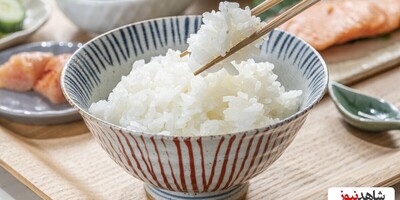Why Rice Became a Staple in the Japanese Diet?
According to SHAHEDNEWS, In this section of health, we’ll explore the reasons that led rice to become a mainstay in the Japanese diet and the thought process behind its widespread consumption.
Weight Loss
Rice is low in fat and sodium but high in fiber, making it an excellent choice for weight management. People who consume brown rice are less likely to gain weight compared to those who eat regular white rice.
Improved Digestion
The high fiber content in rice helps reduce constipation and regulates the digestive system. It also acts as a natural cleanser, helping the body eliminate toxins through the gastrointestinal system and kidneys.
Heart Health
Eating rice regularly as a natural and delicious food can significantly boost heart health. Rice helps improve blood conditions and reduces the risks of heart diseases, attacks, and strokes. The flavonoids in rice combat cardiovascular diseases.
Blood Sugar Balance
For individuals with high blood sugar, rice can be a helpful addition to their diet. Brown rice, in particular, contains three times more fiber and protein than regular white rice. This is why the Japanese often prefer brown rice, as it helps them maintain balanced blood sugar levels.
Youthful Appearance
Japanese women use rice as a means to maintain youthful skin. They believe that regular rice consumption helps them stay young. Rice contains antioxidants that protect the skin from damage caused by free radicals and improve wrinkles and fine lines.
Improved Nervous System Function
Regular rice consumption benefits the nervous system. The body requires various vitamins to maintain a healthy nervous system. Rice contains different types of vitamin B, which aid in regulating biological processes.
Increased Energy Levels
If you’re looking for a way to boost your energy levels, especially before exercise, rice is one of the healthiest options. The body needs carbohydrates to convert into energy, and rice contains healthy carbohydrates that help combat fatigue.












